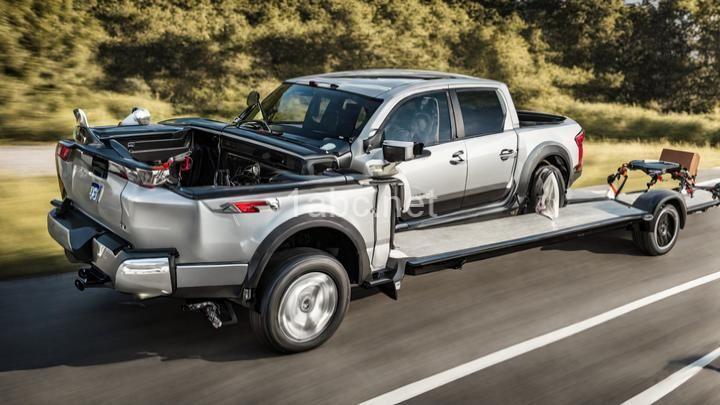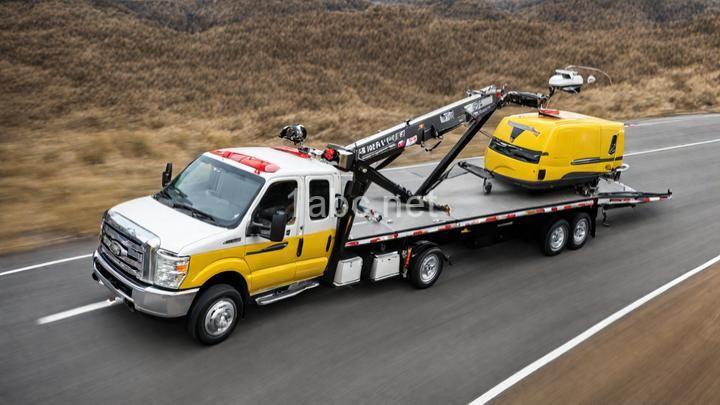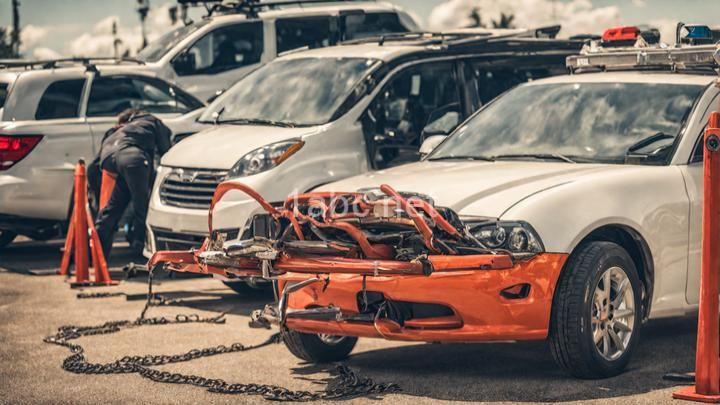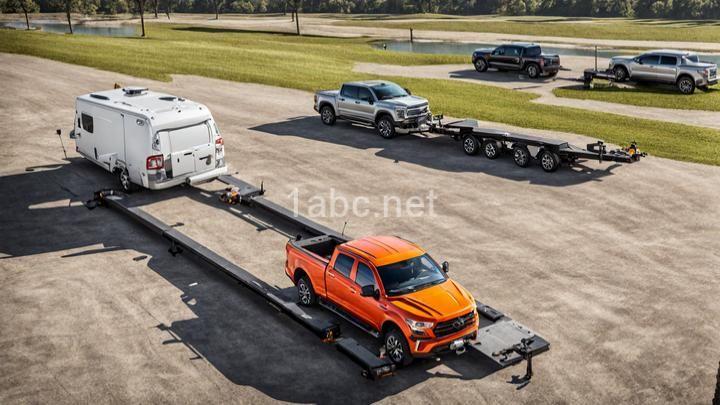Understanding Towing Capacity: How Much Weight Can Your Vehicle Handle?

Introduction:
Hey there, fellow road warriors! Are you ready to dive into the fascinating world of towing capacity? Buckle up because we're about to embark on a journey where we unravel the mysteries behind this crucial aspect of hauling heavy loads. Whether you're planning a family camping trip or need to transport some serious cargo, understanding your vehicle's towing capacity is absolutely essential. So, let's rev our engines and get started!
I. What is Towing Capacity?
Let's start with the basics, shall we? Towing capacity refers to the maximum weight that a vehicle can safely tow. It's like the weightlifting limit for your trusty four-wheeled companion. Just as you wouldn't attempt to lift a grand piano without knowing your own strength, you shouldn't attempt to tow a heavy load without knowing your vehicle's towing capacity.
Now, you might be wondering, what determines a vehicle's towing capacity? Well, my friend, it's a combination of several factors. First and foremost, the engine power plays a significant role. A vehicle with a robust engine is more likely to handle heavier loads with ease. Additionally, the suspension system and braking capabilities also come into play. A vehicle with a sturdier suspension and a well-tuned braking system is better equipped to handle the extra strain of towing.
II. How to Determine Your Vehicle's Towing Capacity:
Now that we understand the importance of towing capacity, let's find out how to determine it for our own vehicles. Luckily, the process is not as daunting as it may seem. To start, you can refer to your vehicle's owner's manual. It's often packed with valuable information, including the towing capacity specific to your make and model.
If you can't seem to locate your owner's manual or prefer a more digital approach, fear not! Many vehicle manufacturers have websites that provide access to detailed specifications, including towing capacity. Just enter your vehicle's make, model, and year, and voila! You'll have all the information you need at your fingertips.
III. Understanding Weight Limits:
Now, let's delve into the world of weight limits. It's crucial to understand the concept of weight limits when it comes to towing. Exceeding these limits can be downright dangerous, so it's important to stay within the safe boundaries. There are a couple of weight ratings that you need to be familiar with.
First up, we have the Gross Vehicle Weight Rating (GVWR). This rating refers to the maximum weight that your vehicle can handle, including the vehicle itself, passengers, and cargo. It's like the ultimate weight limit for your entire setup. Exceeding the GVWR can put excessive strain on your vehicle's components, leading to potential mechanical failures and compromised safety.
Next, we have the Gross Trailer Weight Rating (GTWR). This rating tells you the maximum weight that your vehicle can safely tow, excluding the weight of the vehicle itself. It's important to keep in mind that the GTWR should never exceed your vehicle's towing capacity. Doing so can result in instability, reduced stopping power, and increased wear and tear on your vehicle.
IV. Factors That Affect Towing Capacity:
Now that we've covered the basics, let's explore some additional factors that can influence your vehicle's towing capacity. One such factor is the payload capacity. This refers to the maximum weight that your vehicle can carry in its cargo area, including passengers and any additional load you might be hauling. It's essential to consider the payload capacity alongside the towing capacity as both are interconnected.
Another factor to consider is the axle ratio. This ratio refers to the relationship between the number of revolutions the driveshaft makes and the number of revolutions the wheels make. A higher axle ratio generally translates to greater towing capacity, as it allows for more power to be transferred to the wheels.
Lastly, the type of transmission can also impact towing capacity. Vehicles with manual transmissions often offer more control over gear selection, which can be advantageous when towing heavy loads. However, modern automatic transmissions have come a long way and can still provide excellent towing capabilities.
V. Safety Precautions When Towing:
Alright, folks, let's talk safety! Towing heavy loads requires extra caution and adherence to safety guidelines. Here are some essential tips to keep in mind when towing:
-
Proper load distribution: Ensure that the load is evenly distributed between the vehicle and the trailer. An imbalanced load can significantly affect stability and handling.
-
Regular maintenance checks: Before embarking on a towing journey, give your vehicle and trailer a thorough inspection. This includes checking tire pressure, brakes, lights, and ensuring that all hitch connections are secure.
-
Use appropriate equipment: Depending on the weight of your load, you may need additional equipment, such as trailer brakes or weight distribution hitches. Make sure to use the right tools for the job to maximize safety.
VI. Matching Your Vehicle with the Right Trailer:
Now that we've covered all the nitty-gritty details about towing capacity, let's talk about finding the perfect match between your vehicle and the trailer. It's like finding the perfect dance partner, except this time it's all about weight and compatibility.
When selecting a trailer, consider its weight in relation to your vehicle's towing capacity. You don't want to end up with a trailer that's too heavy for your ride. Additionally, pay attention to tongue weight, which refers to the downward force exerted on the hitch by the trailer. It's crucial to ensure that your vehicle can handle the tongue weight without compromising stability.
Lastly, check for compatibility between your vehicle and the trailer hitch. Different vehicles may require specific types of hitches, so make sure to choose one that matches your vehicle's specifications.
Conclusion:
Congratulations, my fellow adventurers! You've made it through the wild terrain of towing capacity. We've explored the definition of towing capacity, learned how to determine it for our own vehicles, and understood the importance of weight limits. We've also explored the factors that affect towing capacity and discussed essential safety precautions to keep in mind.
Remember, above all else, safety should always be your top priority. Don't push your vehicle beyond its limits and always follow the recommended towing guidelines. With the right knowledge and a dash of caution, you'll be able to navigate the roads with confidence and tow your loads like a pro.
Now, go forth and conquer the open road, my friend. Safe travels and happy towing!
FREQUENTLY ASKED QUESTIONS
How is towing capacity determined?
Towing capacity is determined by several factors, including the vehicle's design, engine power, transmission type, suspension, braking system, and other specific equipment. To calculate the towing capacity, manufacturers conduct various tests under controlled conditions to ensure the vehicle's safety and performance. It is crucial to consult the vehicle's owner's manual or contact the manufacturer directly to get accurate information about the towing capacity of a particular vehicle model.
Where can I find my vehicle's towing capacity?
To find your vehicle's towing capacity, you can follow these steps:
-
Check the owner's manual: The towing capacity should be listed in the owner's manual of your vehicle. Look for the "Towing" or "Towing Capacity" section, or refer to the index for specific information.
-
Visit the manufacturer's website: Many vehicle manufacturers provide detailed information about towing capacities on their official websites. Go to the manufacturer's website and search for your vehicle's make and model to find towing capacity specifications.
-
Contact the manufacturer or a dealership: If you are unable to find the towing capacity through the owner's manual or the manufacturer's website, you can reach out to the manufacturer's customer support or a local dealership for assistance. They should be able to provide you with the specific towing capacity for your vehicle.
Remember that the towing capacity may vary depending on the vehicle's year, model, engine size, and other factors. It is important to refer to the official sources mentioned above to ensure accurate and up-to-date information.
What happens if I exceed the towing capacity?
Exceeding the towing capacity of a vehicle can have various consequences, including potential damage to the vehicle and the trailer being towed. Here are a few potential issues that may arise:
-
Strain on the vehicle: Towing a load heavier than the specified capacity can put a significant strain on the engine, transmission, brakes, and suspension. This can lead to accelerated wear and tear on these components and potentially cause mechanical failures.
-
Poor handling and control: Excessive weight can affect the stability and control of the vehicle, especially during turns, braking, and when traveling at high speeds. This can increase the risk of accidents, loss of control, and potentially dangerous situations.
-
Overheating: Towing beyond the capacity may cause the vehicle's engine and transmission to overheat due to the extra workload. Overheating can lead to engine damage or even a complete breakdown.
-
Reduced braking performance: When towing beyond the recommended capacity, the additional weight can significantly increase the stopping distance. This can compromise the effectiveness of the vehicle's brakes, making it more difficult to stop safely.
-
Damage to the trailer: Exceeding the towing capacity puts excessive strain on the trailer as well. The frame, suspension, tires, and other components of the trailer may become damaged or compromised, leading to potential accidents or equipment failures while on the road.
It is crucial to consult your vehicle's manufacturer or refer to the towing capacity specifications to ensure that you are towing within the safe limits. Exceeding the towing capacity can have serious safety implications, so it is important to prioritize your own safety and the safety of others on the road.
Can I increase my vehicle's towing capacity?
Increasing a vehicle's towing capacity is not as simple as making a few modifications. The towing capacity of a vehicle is determined by its structural design, engine power, transmission, suspension, and cooling systems. These specifications are established by the vehicle manufacturer and are based on rigorous testing to ensure safe and reliable towing capabilities.
In most cases, it is not possible to increase a vehicle's towing capacity beyond the manufacturer's specifications without making significant modifications to its components, which can be costly and potentially unsafe. It is always recommended to consult with a professional mechanic or the vehicle manufacturer to determine the limits and capabilities of your specific vehicle.



